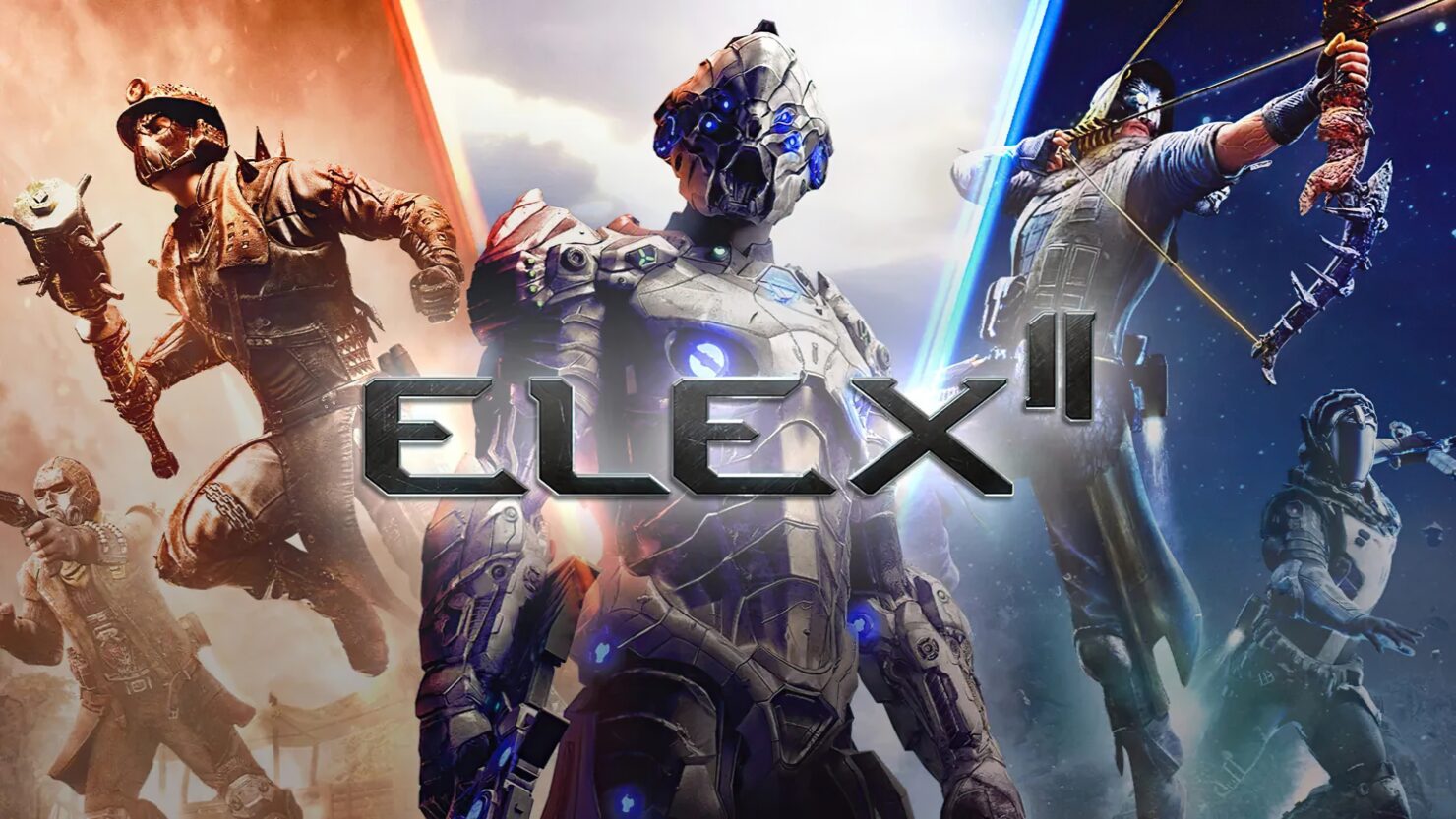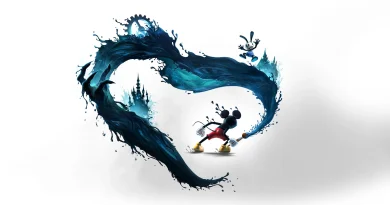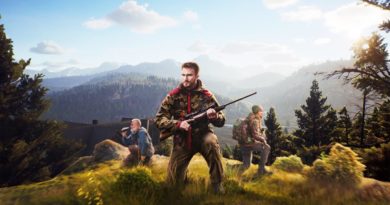Elex II Review (Xbox One) – A Greek Tragedy
Merging sci-fi with fantasy, can the sequel to the 2017 original win over it’s original detractors? The Finger Guns review.
Before starting this review, I thought I’d share what the meaning behind Elex is – a name for boys of Greek derivation, which means “man’s defender, warrior”. It’s also a variant form of Alex, like a certain Alexander The Great. Unlike the warmongering success figure of the Argead dynasty however, Elex II doesn’t really live up to the title of great by any stretch.
The original Elex, released back in 2017, was a title I’d had my eye on in multiple sales but never quite pulled the trigger on playing for myself. It had lukewarm to polarizing reception, but was gleefully accepted more by players than critics. I’d always wondered to myself whether Elex would be in my sphere of esteem. Well, I need wonder no more.
Elex II isn’t a bad game, but it isn’t especially good either. I imagine if you’re one of the supporters of the original, this new installment will provide everything you’re looking for (including glaring flaws which fans of less polished titles come to love). If you’re a newcomer like myself however, the multitude of issues you’ll face trying to have fun in Magalan will be too much to overcome.
Meet The Family
Let’s start from the top. You are commander Jax, famed hero for defeating the Hybrid in years past and rescuing Magalan from the brink of destruction. Years have passed since your heroic deeds and the destroyed world around you has forgotten your actions. Moreover, the people of the land have failed to heed the dire apocalyptic warnings you spread about an impending alien threat. Our nomad hero awakes to the destruction of his quaint little hut and a nasty oozing bite from said alien force.
This sets up a nice way to explain away the “you’re now super underpowered and pathetic at the start of a sequel when you were a God in the previous game”, while also setting the scene of a fractured world crippled by conflict and warring ideology. The initial hours have you setting up your “6th power” to rival the 5 factions scattered across the land, simultaneously meeting each faction and learning their quirks.
Morkons are primitive, zealot-like and embrace death. The Berserkers respect nature and reject technology while reveling in mana. The Albs pursue technological progress but are now seeking “balance” between emotion and science after their failures in early history. The Clerics are religious yet rely on machines to support dwindling numbers. Lastly, the Outlaws just… do whatever the Hell they want, really. Meeting each faction’s leaders and various important figures will allow you to glean more about their ideologies, conflicts and beliefs. How you approach each one and your actions will cause different responses and you’ll need to balance your own morality against the need to bring them all on-side.
See, setting up your own Bastion requires strength, allies, resources and equipment, much of which you don’t have, but they certainly do. On the surface, meeting each faction, exploring their unique fortresses and learning their intricacies is fairly interesting. But that surface is where the fun mostly ends. Almost all of them won’t trust you immediately, so you’ll be relegated to doing their bitch work until 2 or 3 of their head honchos deem you worthy. The use of almost endless fetch quests and busy work quickly nulls any excitement of meeting new people or places, as you’ll know by the time of your 3rd faction you’ll only be asked to traipse around for a while.
Each faction will usually have some subterfuge group trying to undermine the leadership and gain control for themselves. Which is where you come in, as this is an RPG afterall. You’ll have decisions to make, lots of them.
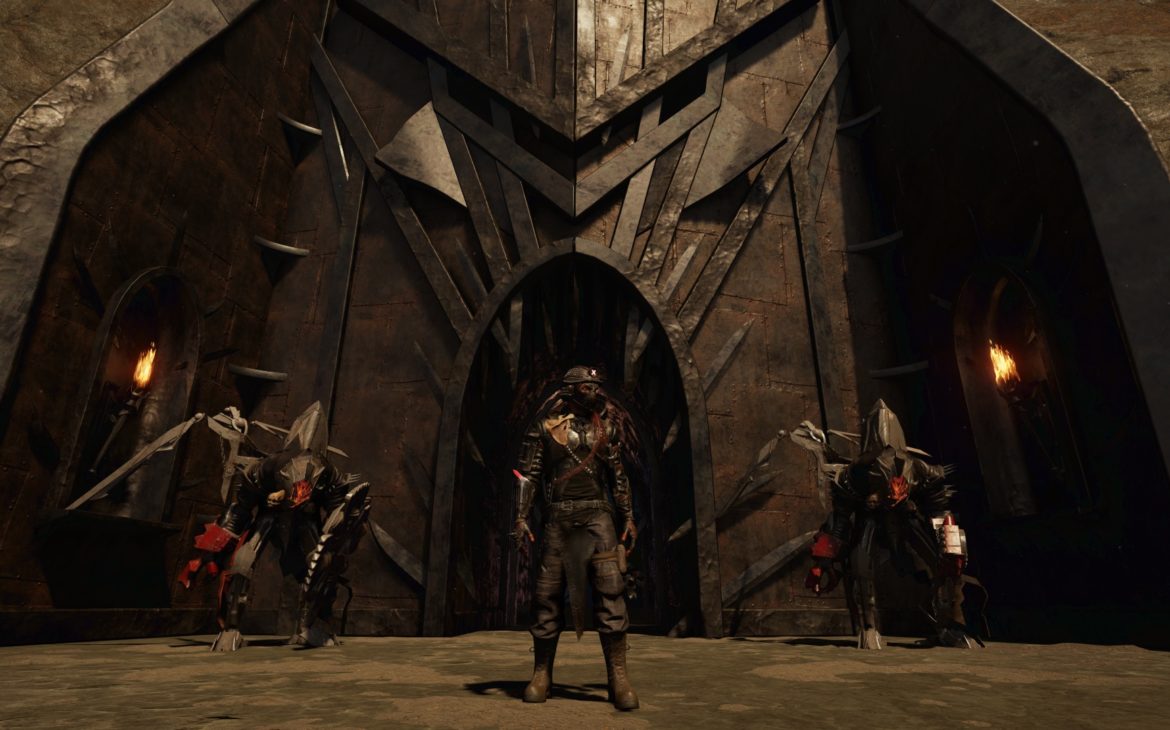
The Trouble With Lexicons
Choice is a big part of Elex II and you’ll constantly be required to decide the fate of all manner of things. Quests can usually be handled in multiple ways. Using force, paying someone off, skill-sensitive dialogue choices are viable options frequently. Will you side with the Berserkers or join the Morkons to exploit death and destruction? Will you attempt to change the established hierarchy or adhere to their standing as they are?
Every choice you make will increase or decrease your Destruction meter, which determines how companions, NPCs and others will interact with you. Later on, it will even determine which factions you can join. Quests can conclude in multiple ways, though the majority will have the same or similar endpoint, just your means of reaching it will deviate. It’s probably one of Elex II’s best systems, as it allows you be a renegade, benevolent force or neutral observer to the world of Magalan.
I reloaded saves and tested out different outcomes often, just to see what would happen. The majority of side quests and even main objectives would usually finish in a similar way or with little observable short-term consequence, but some decisions will have later ramifications for your choices. I liked the system, particularly the use of skill-sensitive options, such as having enough intelligence to out-wit a fool or intimidating them through strength. It harkened back to my Fallout 3 days, which is always a good comparison.
Some choice making can fall a bit flat in places and the sense of pressure on decisions diminished the more hours I put in. Occasionally, Elex II will force you into doing things in certain ways, which while understandable, can undermine your sense of autonomy. Equally, what constitutes Destructive was usually always obvious, except for when it wasn’t. Some choices were clearly intended as more middle-ground or grey areas, yet you’ll be harshly punished for picking them despite the fact they didn’t appear particularly Destructive from the perspective of the player. It started to feel a bit arbitrary.
On the whole though, decision-making was fun. Deciding who to align with and how I wanted my commander Jax to be perceived was cool. I even held off committing to a faction until I’d met them all. Each locale and faction is unique with their own base, equipment, vendors and quest lines, so it’s worth seeking them out before you take an oath.
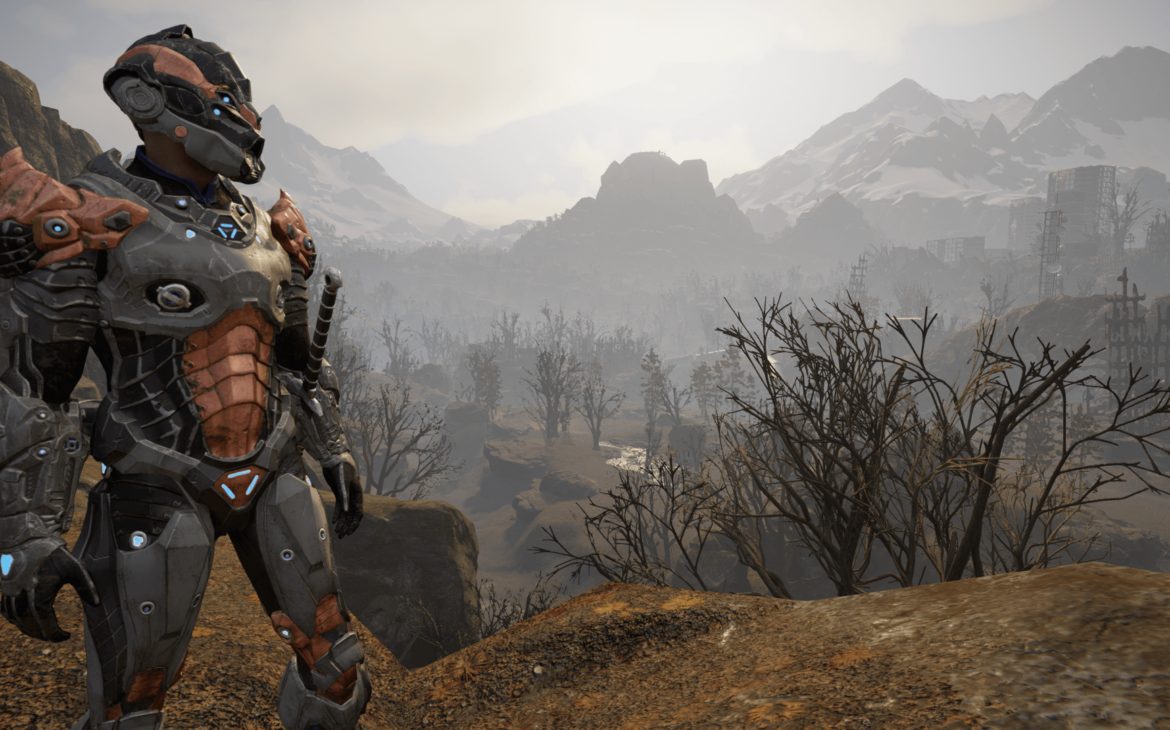
Not A Hit-box In Sight
Sadly, my compliments for Elex II become even less praiseful now we’ve hit the gameplay side of things. The opening hours of Elex II are rough to say the least. Roaming the lands are all manner of wild creatures waiting to gouge your head from its spine. Raptors, rats, burrowing beasts, deathclaw looking assholes, bandits, cyclops’. You name it, it’s in this smelting pot of opponents. You’ll face off against all manner of threats both medieval and futuristic sci-fi.
The premise of this is great, who doesn’t want to mess up a raptor with an energy sword or poison hammer of destruction? I certainly did. Emphasis on the past tense.
Combat is unbearably floaty at times, with our all-powerful commander whiffing the air, stumbling to hit anything slightly above, below or just around him. The camera will get lost in the action, swinging wildly around and the lock-on system will be more burdensome than help. Ranged combat with bows and guns feels loose and imprecise, to the point I stopped really bothering it. If you’re relatively equally matched in strength, you can usually get away with smacking your foe till your stamina depletes, before rolling away to recharge and rinse repeat. The AI is pretty braindead so you can find easy workarounds, even to fights you’re pretty outmatched with.
Yet in the early hours, you’ll have your ass handed to you faster than you can say “I’m getting wrecked”. Raptors in particular are so quick and have such long lunges they’ll obliterate you in a single swipe. Which would be fine, if they weren’t in the immediate vicinity of the starting location and early quests didn’t take you straight into their path. Most of the game’s pacing seems completely out of whack, with you having to avoid most encounters until a few hours in once you have a companion. How heroic our commander is standing there on the sidelines while Caja blasts the hell out of everything with fire. Truly inspiring.
Once you manage to get some upgrades and purchase some better gear, combat does become marginally more exciting. The caveat to this being that now you’re the one smashing organic matter straight off of cliffs instead of being the ragdoll. Very rarely was there a balanced or satisfying engagement to be found. Either I was getting stomped or I was the one doing the stomping. Both routes felt underwhelming and the various issues with the combat and mechanics being so floaty made conflicts more of a nuisance than an exhilarating prospect.
It wouldn’t be so bad if the progression and currency systems allowed you build up quickly, but Elex II seems determined to stifle your progress here as well.
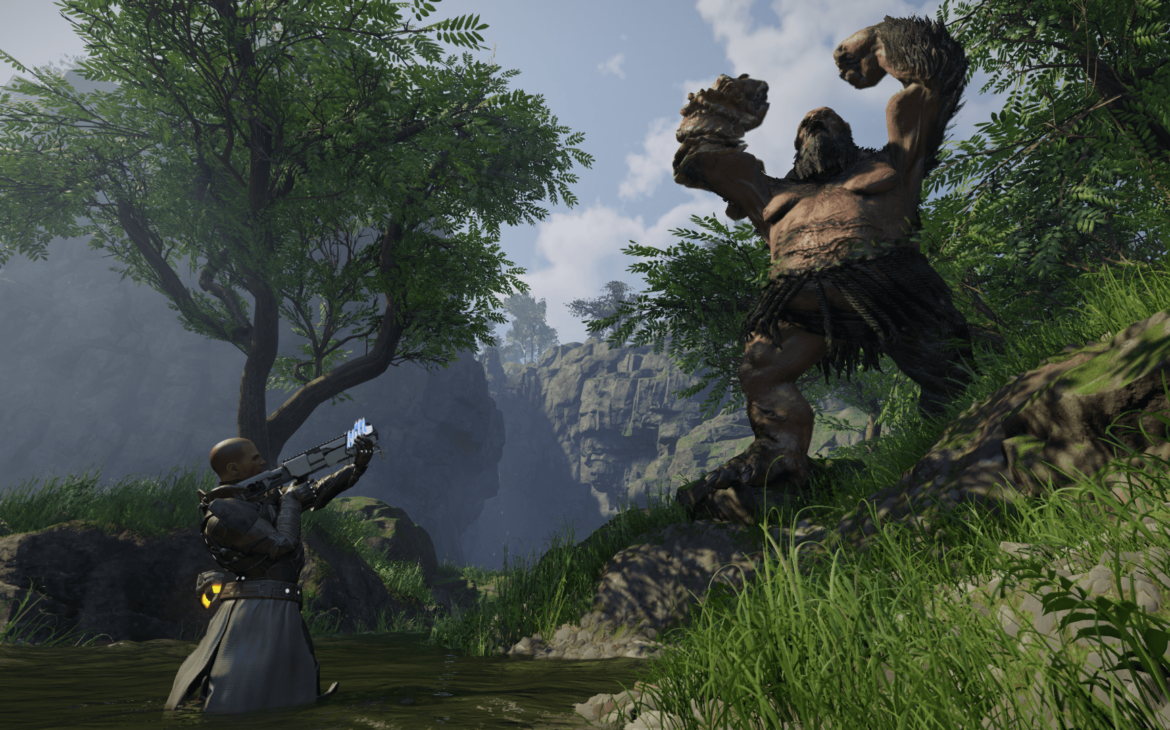
Why Be A Badass When You Can Use Shields Of Frying Pans?
Almost 14 hours into Elex II, I was still having to use a shield made of frying pans and I’d only just outfitted my commander will a full set of clothing. I still had additional slots empty and only had a semi-decent weapon to beat down the enemy with. Progression feels unbearably stifled, particularly early on. Shards are the universal currency and it’s dolled out semi-frequently for your work. The problem is how its so quickly distributed amongst so many competing, expensive systems.
Need a new weapon? You’ll need to spend upwards of 1500 shards to unlock the skills to craft weapons that are decent. Why not just buy one? Cause it’ll cost equal if not double the same amount. Failed to impress a particular NPC but want to finish their quest? Spend 1000 shards. The constant competition for such a limited resource rapidly soured my desire to basically do anything. It stifles your ability to complete both side and main objectives, so you can’t make money to make better gear, so you get stuck doing the menial stuff or avoiding the supposedly fun aspect of battle in order to efficiently finish and actually make some money.
The easiest solution to this is to join a faction to gain their gear – but doing this early on negates your ability to join other factions. By the time you’ve met all of them, this problem is slightly alleviated, so you either suffer for the first 10 hours horrendously, or have an easier ride but sacrifice your ability to make important decisions. The progression and currency system puts itself at odds with the decision-making systems, which really grated on me the longer I played.
Persevere I did however, eventually gaining some upgrades for my pathetically frail commander. As you level up, you’ll gain attribute points allowing you improve strength, dexterity, cunning, intelligence, the regular suspects. Investing points opens up new means for equipping stronger weapons, developing powers, dialogue options and combat opportunities. You’ll also gain skill points, which you invest with certain NPCs who’ll train you, for a fee (obviously).
Various people around Magalan will specialise in trades and crafts. So naturally, you can absorb their knowledge to increase your own proficiencies in all manner of skills. I actually came to appreciate this system a lot. It fits narratively in the world, with you scoping out specialists who provide their experience and knowledge so you can become stronger, smarter, craftier and everything in between. You can’t just skill up in any old place, you have to visit each specialist to do it. There’s extensive skill trees to choose from so you can really diversify your build based on how you want to play.
Problem is, every trader will want pay, with each increment in a skill becoming more and more expensive. It again gatekeeps your progress and limits your ability to actually improve. At one stage I had 8 skill points but only 30 shards, leaving me stranded with a useless number of potential fun I could be having, but wasn’t because I couldn’t afford it. The ideas here are solid, but the execution just dampened the whole crux of an RPG. I never felt like I was really getting that much stronger, just incrementally less cowardly, at the expense of all the other things I now couldn’t afford.
If levelling up in an RPG isn’t rewarding, there’s something seriously wrong. Elex II suffered for me significantly on this front. Once you’re over the initial early hump, it does improve somewhat, but I imagine a lot of players won’t stick around to find out.
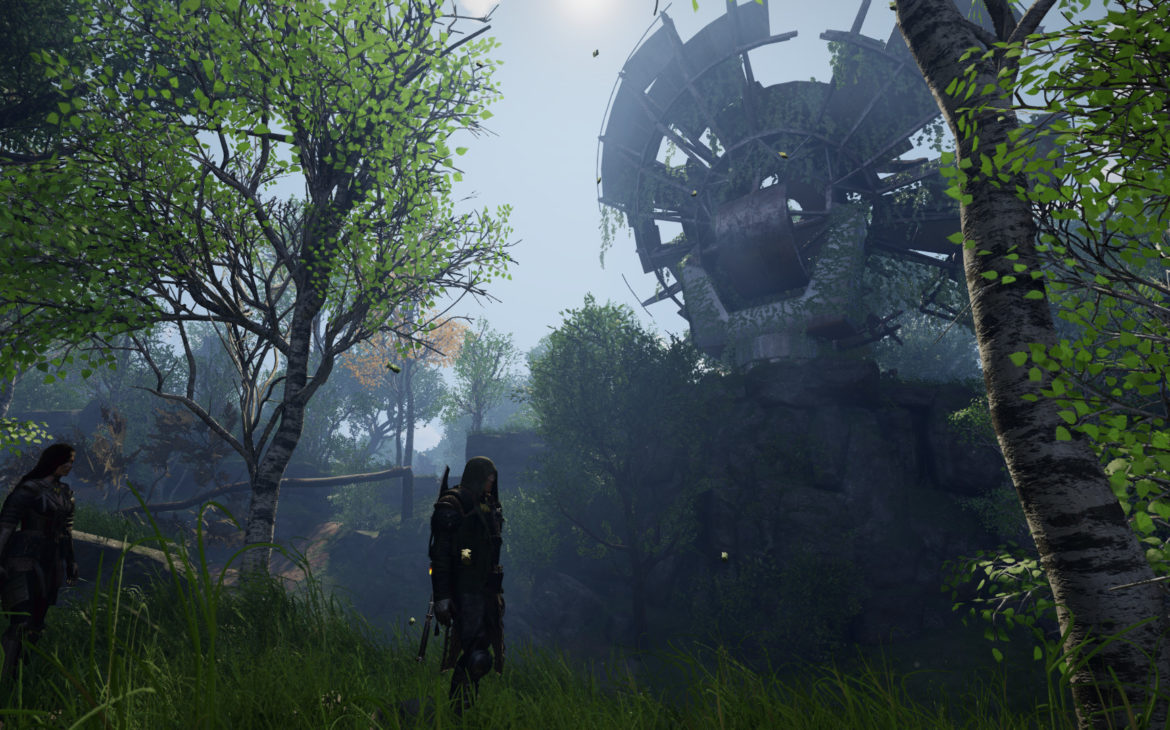
A Friend Indeed
Thinking less selfishly, your commander’s job in all this chaos is to establish a powerful faction to take on the ethereal threat currently harvesting and terraforming all of life around you. In order to do this, you need to develop Bastion, your base, and recruit allies in the shape of companions. If you’ve played Dragon Age: Inquisition, you’ll notice the parallels with Elex II almost immediately.
There’s a wide group for you to find and recruit on your travels from the various factions, as well as an adorable little Alfred-type drone to find. Your decisions will impact their perception of you if they’re accompanying you and you’ll get the opportunity to help them in their own endeavours through their unique side-quests. Unlike Mass Effect however, these side stories are nowhere near fleshed out enough or well written to make them compelling.
Remember joining Miranda to aid her sister in her loyalty mission to prevent their father creating a “dynasty”? Yeah, none of that kind of depth is apparent here. Your companion will tell you of a mission they need to do, you warp to it, usually kill some things, then it ends. Occasionally, they’ll be a moral dilemma or a companion may need time to reflect on their actions, but it all feels pretty inconsequential.
Having said that, one area that works is how damn powerful some companions are. Fox can cleave through beasts with his axe at will, Bully and Nasty can smack talk while laying down the pain and Caja can throw down fireballs with aplomb. Companions go some way to alleviating the grind of combat and luckily they can’t die, they’re only incapacitated in combat, so you don’t have to babysit them.
Watching Bastion slowly develop with more NPCs and people milling about, knowing you’ve recruited and brought them under your wing is a nice touch. It goes someway to making Bastion a place you’ve built, I just wish the stories behind the companions had been developed a bit more, rather than being artificial exposition to justify more uninteresting to-do lists.
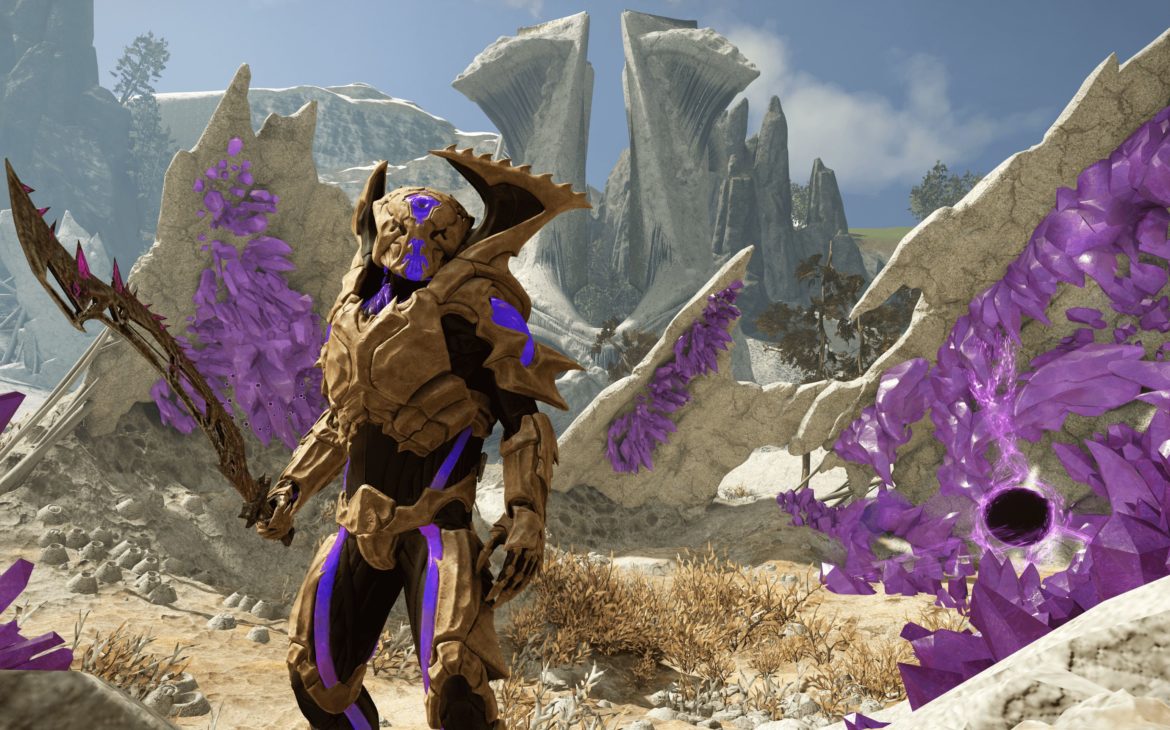
Torn Asunder, With Purple
Finally, lets talk about Elex II’s graphical and performance… offering. Right out of the gate, Elex II is not a pretty title. The land of Magalan is for the most part, barren, lifeless and not in that post-apocalyptic kind of way. Large stretches of geometry have little to appreciate. Sections of what remains of the old world are empty and bland to look at. Creature and enemy design, as well as the looks of various armour sets are great, but so much of the world is just boring to wander around.
Faction fortresses are at least unique and have a sense of identity, but it all just gets mashed together in visual style which is as appealing as a wheelbarrow of bricks. It didn’t matter if I was in the wilderness of the Berserker territory or the snow-tinged expanses of the Albs’ land, there was nothing for me to become absorbed in. Building interiors are reused often, character’s faces are waxy and lack detail, though to their credit, the lip-syncing is generally pretty good. Voice actors are notably reused across dozens of NPCs and the whole package just feels rough and lacking an impactful art style.
None of this is helped by the abundance of performance problems. My framerate tanked on numerous occasions when in densely populated areas like the Berserker’s base or the Outlaw’s tinned city. Companions or quest NPCs would become stuck in-place, unable to reach the locations they were designated to go. Prompts for interactions would lag, causing me to accidentally steal an item instead of speaking to a person, requiring a reload or screwing over my playthrough. Companions would get stuck on geometry, keeping them outside an interaction’s distance so I could be a complete jerk and they wouldn’t trigger a response.
All of this absolutely pales in comparison to the texture pop-in, which is so utterly rampant it might as well be an outbreak of rabid dogs. Trees will emerge right before you, surfaces will be chunks of blurred nothingness. Most of the world doesn’t seem to properly exist until you’re within about 2 feet from it, and the impact it has is totally jarring. A little texture and object pop-in for open world games is acceptable, but this is just painful when you’re trying to get immersed to see the gears creaking so obviously.
Elex II also crashed when saving about 3 times, which is cool. Luckily the save still goes through, but it was annoying nonetheless.
I wish Elex II had taken some more time to iron out its graphical issues, because the design of some armours, weapons and enemies is genuinely awesome, they’re just buried under the mud of everything else. For every 1 aspect I started to appreciate, another 5 blatant problems would rear their ugly head to ruin it.
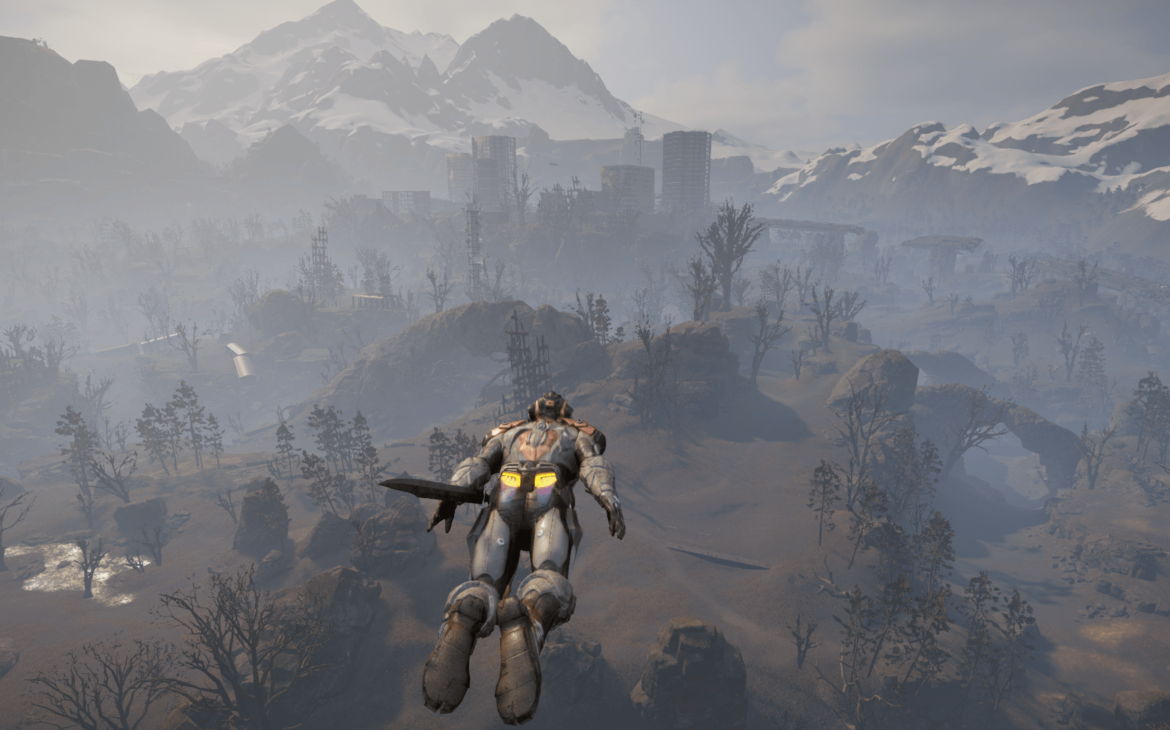
Exit The Elex
If I had to sum up my time with Elex II, my response would be the personification of “great ideas, bad execution”. There is a good game in here, suffocating somewhere inside. There are elements I love like the decision making, companions, unique factions and addictive questing. But for everything Elex II does right, it has an overwhelming number of flaws or issues that constrict its ability to sing.
Having missed the first one, I can’t say I’m sad that I never played it, if the sequel is anything to go by. For fans of the original, this will probably be more of the same and you’ll be able to love it despite its glaring warts. If nothing else, it’s a large game, packed with content, things to do, stuff to find and alternate routes to take. I just lost any sense of enthusiasm to play any more of it once I realised the issues with its progression and gameplay just weren’t going to alleviate.
I sincerely hope fans of the first get their fill with this one and if you end up enjoying it, all power to you. Elex II will sit in my decent enough cabinet but filed away under the so fundamentally flawed I can’t bring myself to keep playing category.
Elex II is a prime example of great potential being suffocated by poor execution. A large world filled with quests, unique factions and interesting lore can only carry you so far when the combat is floaty, the progression is stifling, the graphics bland and its performance breaks so visibly, so often. Instead of slaying raptors with lasers, you’ll be waiting for the game to pop-in the fun while it chugs out another texture it missed.

Elex II is launching on Xbox One (review version), Xbox Series X|S, PS5, PS4 and PC on March 1st, 2022.
Developer: Piranha Bites
Publisher: THQ Nordic
Disclaimer: In order to complete this review, we were provided with a promotional copy of the game. For our full review policy, please go here.
If you enjoyed this article or any more of our content, please consider our Patreon.
Make sure to follow Finger Guns on our social channels –Twitter, Facebook, Twitch, Spotify or Apple Podcasts – to keep up to date on our news, reviews and features.
